Honeymoon Island State Park has a spectacular beach, a sweet name and one of those classic Florida-history stories.
It’s also a favorite beach for a populous urban area. Yet the beauty of Honeymoon Island State Park is that even though it attracts crowds, you can still find beauty, solitude and nature.
Note: Since early April 2024, the sandspit that extends three miles north has split in two, creating a new pass. It’s located about one mile from the tip of the park. Erosion and sand migration have connected the Gulf to the Intracoastal, and it’s still shifting. The park cautions that deep water, rapidly changing water depth and strong currents make it unsafe to venture into or through the water here. The pass that separates Honeymoon Island from Caladesi Island formed like this during a hurricane in 1921.
Honeymoon Island State Park is an unusual combination of an accessible beach with lots of parking, first-rate concessions and facilities, and a natural beach with extensive areas full of wildlife.
You reach Honeymoon Island State Park via the 2.5 mile long causeway. We were bicycling the nearby Pinellas Trail, so we biked out to Honeymoon Island on a trail that is widely used by cyclists, joggers and pedestrians.
The causeway offers scenic views of St. Joseph Sound and there is free parking all long it. The causeway is a destination unto itself — a popular place to fish or launch kayaks.
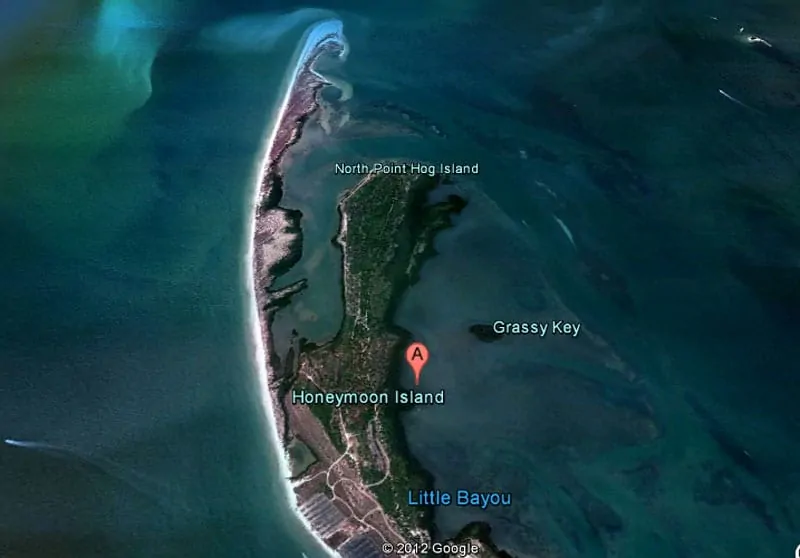
Honeymoon Island beaches
The 385-acre park has four miles of beach in three distinct beaches plus 2.5 miles of hiking trails through pine flatwoods .
The first Honeymoon Island beach you come to, labeled Main Beach, is broad and wide with that fine-grained white sand you find at the best of the Gulf’s beaches. There are huge parking lots and well-tended restrooms plus a café.
People with extensive gear – coolers, umbrellas, six boxes of pizza — filled this beach. When people talk about Honeymoon Island State Park having a perfect beach, this is what they’re talking about.
South of this beach, very near the entrance to the island, is Dog Beach, where dogs on 6-foot leashes are welcome. Dog beach faces on Hurricane Pass, a good place for fishing but a somewhat hazardous location for swimming. Hurricane Pass separates Honeymoon Island from nearby Caladesi State Park. These two islands were one before the 1921 hurricane blew through.
My favorite, though, was the northern-most Honeymoon Island beach. This beach wouldn’t win any awards for its sand, because it is studded with rocks and seashells, and the beach is much narrower. But the north beach goes on and on and the farther you walk, the more stunning the scenery.
The Honeymoon Island beach is actually a sand spit extending into the Gulf of Mexico. It’s three miles to the end, and we walked it all, passing a rare beach-walker or boater along the way, but largely having the wide expanse of sand and surf to ourselves.
The reward for the long beach walk was reaching the end of the sand spit, where broad, flat tide pools, sand dunes and salt marshes stretch out in every direction.
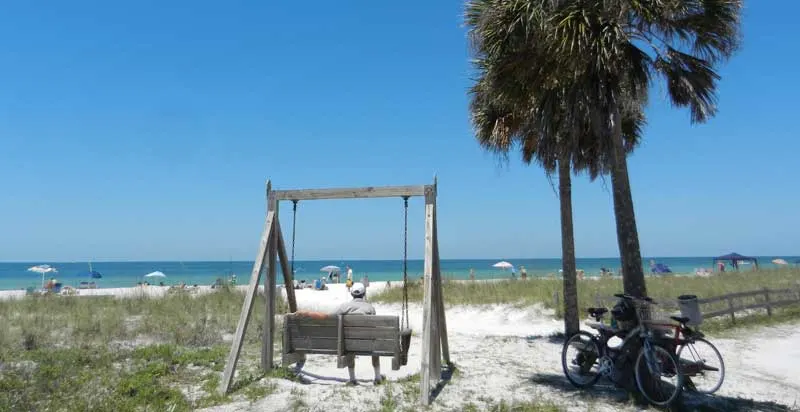
Wildlife and trails at Honeymoon Island State Park
Away from the Honeymoon Island beach, a peninsula that juts into St. Joseph Sound is filled with pinelands and wildlife. The two trails, totaling 2.5 miles, loop through the area, which is home to more than 50 pairs of osprey and their nests. Occasionally, an American bald eagle nests here and great horned owls are frequent spring nesters.
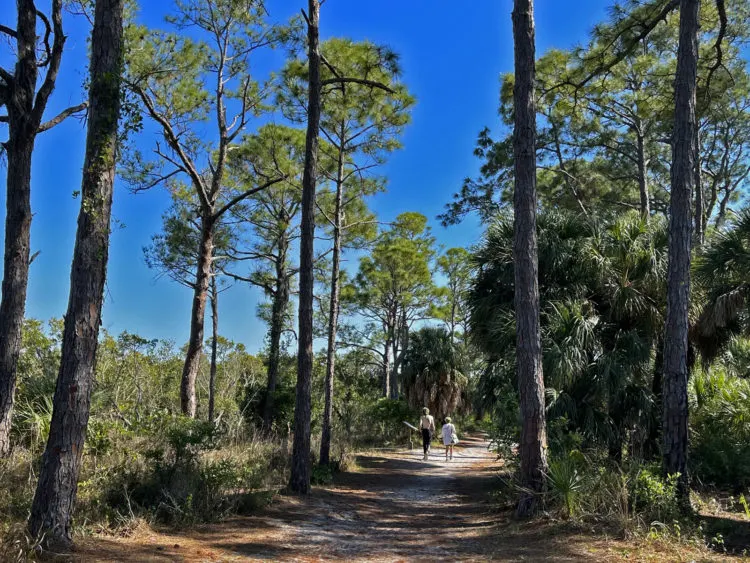
Hikers on these sandy trails (too sandy for anything but fat-tire bikes) are likely to see gopher tortoises (we did) and armadillo. Signs warn about rattlesnakes, too, and several visitors mention on TripAdvisor that they did indeed spot rattlesnakes. At times, people report mosquitos are brutal, so bring repellant.
Sections of this trail will close when eagles are nesting here.
Funky Florida history at Honeymoon Island State Park
Would we still love this beach if it were called Hog Island?
Clinton M. Washburn didn’t think so. Washburn was one of those 1930s Florida real-estate marketing geniuses who came up with zany ways to attract attention.
In 1939, Washburn bought Hog Island, so named because it was home to a hog farm. After failing to sell the island for $25,000, he came up with a contest in conjunction with Life Magazine that was featured there and in a 1940 Paramount newsreel.
Newlyweds were invited to write Washburn to apply for free vacations on the re-named Honeymoon Isle on Florida’s Gulf Coast. Washburn had had 10-by-12-foot wooden thatched huts built on the beach. Each cottage came with a row boat and had a gas stove, but huts had no electricity and no plumbing. Couples had to be married less than two weeks and had to pay their own way – or have their travel sponsored.
Washburn was swamped with letters: Such is the power of tropical-island dreams!
Applicants included future president Ronald Reagan and Jane Wyman, according to an exhibit a decade ago at the Dunedin Historical Museum. (They weren’t selected; they’d been married too long.)
Honeymooners in cottages named “Love Nest” or “Love Birds” swam, fished, explored, played cards and gathered in the evening in a recreation hall/grocery store, which did have electricity.
The nature center on the island has an exhibit depicting the Honeymoon Isle story. It’s full of wonderful staged black-and-white photos of couples living up to honeymoon stereotypes – she threatens him with a frying pan, he poses sadly peeking from a dog house, together they cuddle in hammock.
The honeymoon contest ended when life changed with Pearl Harbor. Washburn sold the island to Arthur Vining Davis in 1956 for $600,000 and it became a state park in the 1970s.
A 2000 St. Petersburg Times story about Honeymoon Island says that in 1991, 15 of the original honeymoon couples reunited on Honeymoon Island. They said it really was paradise.
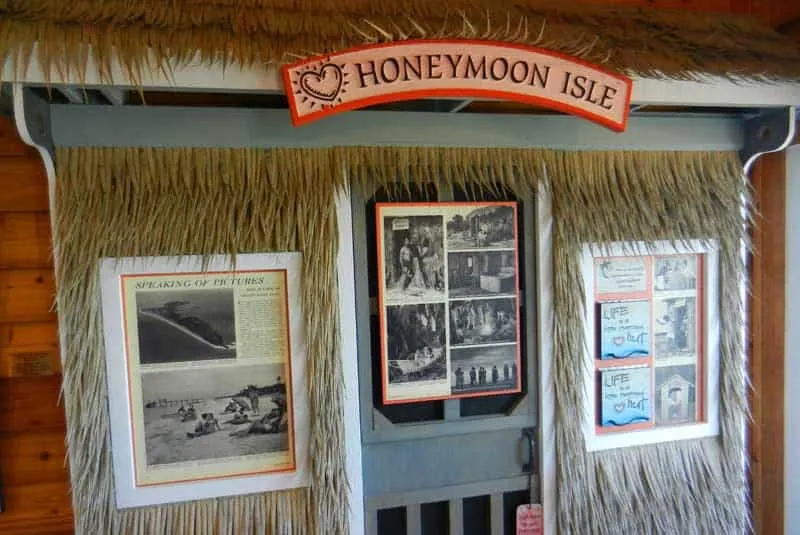
Planning your visit to Honeymoon Island State Park
Greatest asset: Great amenities with access to a wild and pristine beach
Parking: Ample and no extra charge beyond park admission
Honeymoon Island entrance fees: $8 per vehicle and $2 for a bicyclist.
Alcohol: Not allowed, but Cafe Honeymoon serves beer and wine.
Pets: A dog beach makes this popular with pet-lovers. Dogs must be on 6-foot leashes.
Surfing: Surfing is allowed in the park, and is best on the north end by Bathhouse 3.
Honeymoon Island State Park does not allow camping.
Location: #1 Causeway Boulevard
Dunedin, Florida 34698
(727) 469-5942
While you’re visiting Honeymoon Island State Park:
- From Honeymoon Island, you can take the ferry to Caladesi Island State Park, named America’s best beach in 2008. Tickets are $16 adults/$8 children round trip and a four-hour stay. Caladesi trip report.
- Café Honeymoon on the island serves meals 10 a.m. to 5 p.m., offers beer and wine and even plans beach weddings.
Things to do nearby
Dunedin: Delightful biking, breweries, beaches & more
Safety Harbor Spa: Healing waters are star of charming town
7 things to do in St. Petersburg for Old Florida delights
Best camping near Tampa Bay: 9 choice campgrounds

The author, Bonnie Gross, travels with her husband David Blasco, discovering off-the-beaten path places to hike, kayak, bike, swim and explore. Florida Rambler was founded in 2010 by Bonnie and fellow journalist Bob Rountree, two long-time Florida residents who have spent decades exploring the Florida outdoors. Their articles have been published in the Sun Sentinel, the Miami Herald, the Orlando Sentinel, The Guardian and Visit Florida.

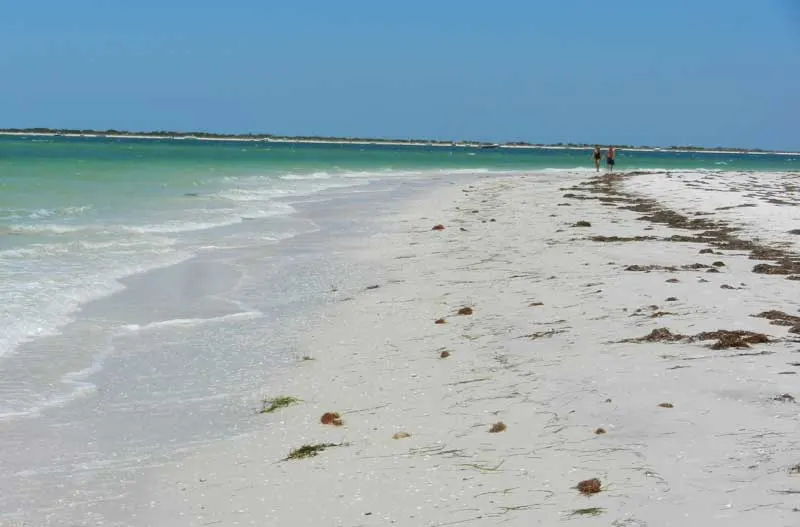
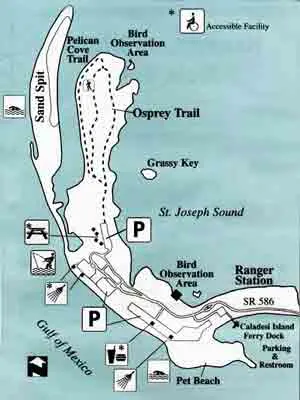
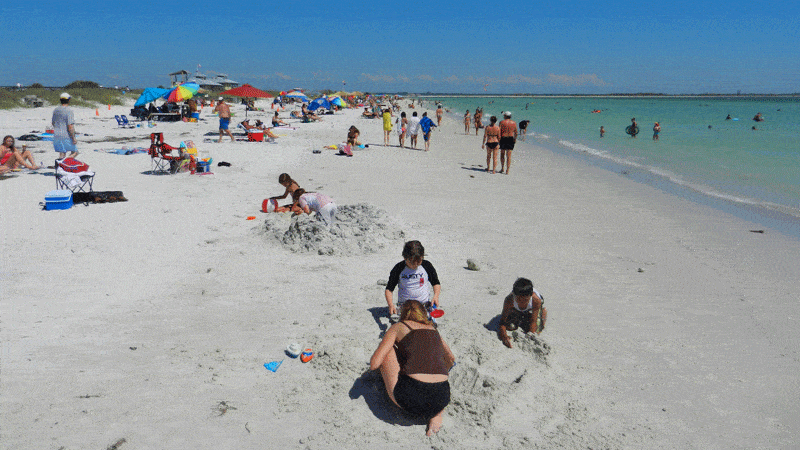
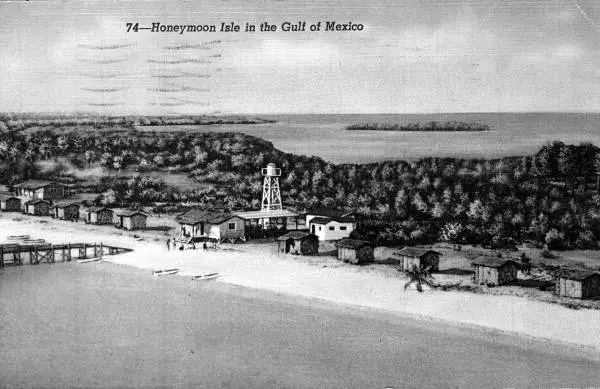
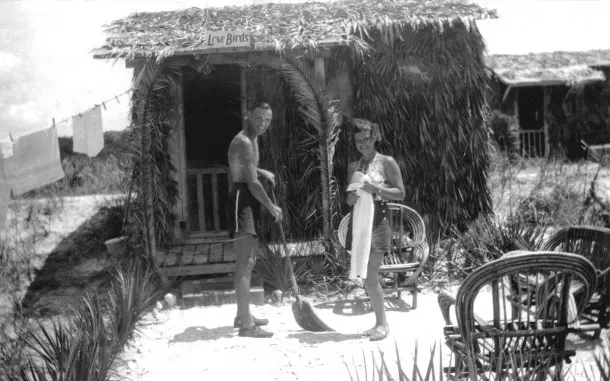
Hope
Wednesday 29th of June 2022
We visited Honeymoon Island several times while we were there in the winter months. We loved it and so did our dogs.
Susan Hatfield
Saturday 12th of March 2022
The beach on honeymoon island is full of seaweed and hard to reach the water right now. Shelling is not good